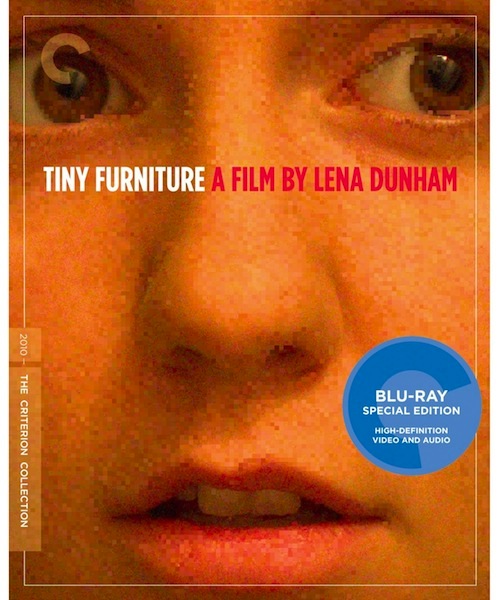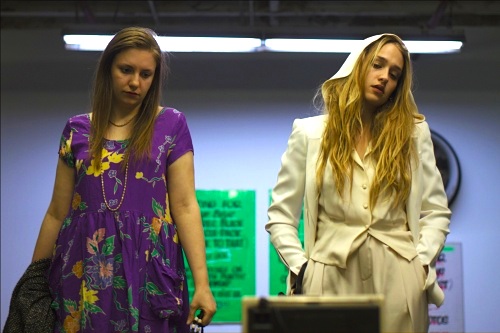 By Patricia Ducey. On the long road of life, sometimes a fish does need a bicycle.
By Patricia Ducey. On the long road of life, sometimes a fish does need a bicycle.
Tiny Furniture is Lena Dunham’s 2010 filmmaking debut, and led to her HBO series Girls. Given the assurance Dunham shows here as both a writer and director, it is not surprising HBO took the risk.
Loosely based on Dunham’s own life, the movie tells the story of Aura, played by Dunham, who’s on the cusp of a life fraught with uncertainty and danger; she has graduated from Oberlin College with a degree in film theory and has no job, and nowhere to go but home. Like Dustin Hoffman in The Graduate, and other youth-in-identity-crisis movies, Aura lives in a state of free-floating anxiety, born of personal confusion and career uncertainty.
Aura returns to her family’s stylish Manhattan townhouse cum studio and greets her mother Siri, an artist (played by real mother Laurie Simmons), who can hardly be torn away from her latest photography project – a portrait of daughter Nadine’s legs (real life sister Grace) looming over a tableaux of the aforesaid tiny furniture. Aura awaits a greeting, to no avail. Siri may not have time to say hello, but she has cultivated a wide array of chic friends and contacts in the hip Manhattan art scene that might prove useful to Aura – so Siri dispatches her, on her own, to a party sure to be filled with such possibilities.
There she sees her old friend Charlotte (Jemima Kirke) who holds her hand through her transition home. She also fixes Aura up with Jed (Alex Karpovsky), a YouTube artist, who the recently dumped Aura finds attractive. Her mother and sister depart on a college visiting trip – so Aura invites Jed, in town with no hotel for meetings, to stay with her. Then Aura starts her hostess job, also provided by Charlotte, where she also develops a crush on the chef. But neither swain is interested really, perhaps because Aura wears her need so plainly all over her face. She eventually entices Jed to sleep with her, and he does actually sleep — nothing else. The chef sets up what she hopes is a date, but the date turns out to be nothing but a ghastly hookup in a back alley — they can’t go to his apartment because after all he hasn’t quite left the girlfriend who lives there.

So the men are on the periphery of the story, with a mother and two daughters forming the triad that moves the story forward. They compete, argue, lie and – rarely – understand one another. Most tellingly, no father is present or even mentioned; we don’t know if the father is on a business trip, or is absent due to divorce, death, artificial insemination or what. His absence hangs over the entire film; and if this is post-feminist America, I will take the patriarchy. (It would be too easy to assume that this replicates their real family; in fact, Dunham’s father, artist Carroll Dunham, is very much in the family and the marriage and – as Dunham has related in an interview – very much the maker of the rules in the home.)
So you don’t have to be a Freudian to see that what Aura needs is a parent, any parent really, but particularly a father. Her mother is emotionally unavailable, her father physically and emotionally so. The daughter Aura is lost, a child on the verge of adulthood with no one to lead her forward. She has no hope and no boundaries; she (unconsciously perhaps) chases Jed; she tells herself she is going on a date with the chef when he really wants her Oxycontin and some sex, as long as she’s offering. So again, the men she seeks out are either emotionally distant or callous louts.
I don’t mean to imply, though, that Tiny Furniture is another twee and ennui-soaked Manhattan fable. Dunham eschews many tics of the genre — like the annoying, deadpan non-acting prevalent in so many similar films, or the hopelessness that stands in for wisdom. The film manages something more. No spoilers here, but the last sequence, when Aura relates her sexcapade with the chef to her bored, sleepy mother, implies a nascent humanity within her that is salutary. Denied a father, and the better part of a mother, Aura might just save herself.
Posted on January 21st, 2012 at 9:56pm.
Ugly, tawdry and dull.